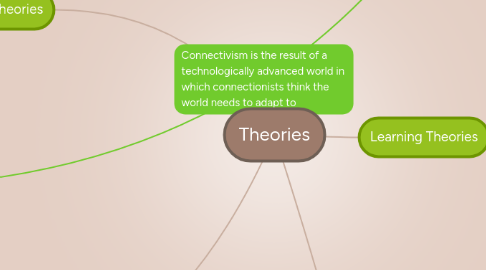
1. Philosophy of Teachnology
1.1. This is a teachers opinions and beliefs about technology
1.2. It includes a teachers use of technology in the classroom
1.3. A teachers philosophy of teachnology also typically includes their experiences teaching, their educational beliefs, and their role as a teacher to present a well-rounded philosophy
1.4. This can be changed as the teacher learns and improves and as new technologies emerge
2. TPACK (Technological Pedagogical Content Knowledge)
2.1. Combines the spheres of technology, content, and pedagogy under context.
2.2. Has a very useful image to display TPACK
2.3. Intends to assist teachers combine their content knowledge with their pedagogical knowledge while incorporating technology for the best learning environment for students.
2.4. Teachers can constantly refer back to the TPACK model and improve their lessons for the optimum learning envrionment
3. Technology Theories
3.1. SCOT (Social Construction of Technology)
3.1.1. Theorists
3.1.1.1. Pinch
3.1.1.2. Bijker
3.1.2. Main Ideas
3.1.2.1. Society and people influence technology
3.1.2.2. Interpretive Flexibility
3.1.2.2.1. Each artifact has different meanings and interpretations for various groups. Ex: bicycle tires (aesthetics vs practicality)
3.1.2.3. Relevant Social Groups
3.1.2.3.1. Can be distinguished by "Their shared or diverging interpretations of the technology in question." (Wikipedia)
3.1.2.4. Design Flexibility
3.1.2.4.1. Multiple ways of creating and constructing media which reflects their media ideology
3.1.2.5. Problems and Conflicts
3.1.2.5.1. With new technology problems will arise that will have impact on the general ideologies of the media
3.1.2.6. How it Affects Education
3.1.2.6.1. Teachers would have to be aware of their influence on technology and how that knowledge transfers to the students
3.2. Media Ecology
3.2.1. Theorists
3.2.1.1. McLuhan
3.2.1.2. Postman
3.2.2. How it affects Education
3.2.2.1. Teachers would have to be aware of the different technologies and how their students are being affected as well as possible adjustments that would have to be made to the class and curriculum.
3.2.3. Main Ideas
3.2.3.1. Technology influences society
3.2.3.2. Media ecologists are interested on how media affects people's thought, values, behaviours and feelings (Media Ecology Association)
3.2.3.3. Is the study of media as environments
4. Learning Theories
4.1. Constructivism
4.1.1. Basic Principles
4.1.1.1. Contains the idea that people build on top of previous knowledge
4.1.1.2. Must interact with the environment
4.1.1.3. Collaboration is encouraged to help students build upon their knowledge
4.1.1.4. Students are not a blank slate
4.1.2. Connections
4.1.3. How it affects education
4.1.3.1. Teacher becomes a facilitator
4.1.3.2. Case based learning, collaboration, problem or project based learning is used
4.1.4. Examples
4.1.4.1. Science fairs
4.2. Connectivism
4.2.1. How it affects Education
4.2.1.1. Some people say that teachers would no longer be needed, that the networks could be the teachers.
4.2.1.2. Teachers would have to alter their role and their assessment ideas
4.2.1.3. Teachers become an expert or a guide
4.2.2. Connections
4.2.2.1. Is somewhat a technological theory: was created for the technologically-advanced world
4.2.3. Basic Principles
4.2.3.1. The student is in charge of their own learning
4.2.3.2. Involves the use of many connections and networks
4.2.3.3. Created for the technological world where any information a person could want or need is available via technology
4.2.3.4. Has the idea that students should learn how to acquire the knowledge they need rather than to figure it out themselves
4.3. Behaviourism
4.3.1. Basic principles
4.3.1.1. Practice makes perfect
4.3.1.2. Stimulus - Response -> Repetition
4.3.1.2.1. Ex: Multiplication Tables
4.3.1.3. Operant Conditioning ->Reinforcement
4.3.1.4. Punishment and Consequences
4.3.2. Key Theorists
4.3.2.1. Watson
4.3.2.2. Thorndike
4.3.2.3. Skinner
4.3.2.4. Pavlov
4.3.3. Examples
4.3.3.1. Multiplication Tables
4.3.3.2. iClickers
4.3.3.3. Math Blasters
4.3.4. Criticisms
4.3.4.1. Oversimplifies learning
4.3.4.2. The mind is not a blank slate
4.3.4.3. Learning does not always require reward or punishment
4.3.5. How it affects Education
4.3.5.1. Primary role as a teacher is to be a lecturer, using direct instruction
4.3.5.2. Teachers would assess students using repetitive measures
4.4. Cognitive Load Theory
4.4.1. Cognitivism
4.4.1.1. Main Theorists
4.4.1.1.1. Gagne
4.4.1.1.2. Bruner
4.4.1.1.3. Vygotsky
4.4.1.1.4. Piaget
4.4.1.2. Key Ideas
4.4.1.2.1. The mind is a computer
4.4.1.2.2. The brain has sensory, short term (working memory), and long term memory
4.4.1.2.3. Organization is key, with meaningful effect
4.4.1.2.4. Motivation is also a key component
4.4.1.2.5. Schema - Scaffolding
4.4.2. Basic Principles
4.4.2.1. The brain can only handle so much in its working memory, about 7 different things
4.4.3. How it effects education
4.4.3.1. Teachers have to learn to reduce distractions and other unnecessary added effects when teaching
4.4.3.2. Teachers can chunk materials, use helpful diagrams or pictures, keeping the information manageable for their students
4.4.3.3. They also must realize the limits of their students and when they are at the point of being overloaded
4.4.4. Connections to other theories
4.4.4.1. Technology used such as Prezi or Mindmeister!
